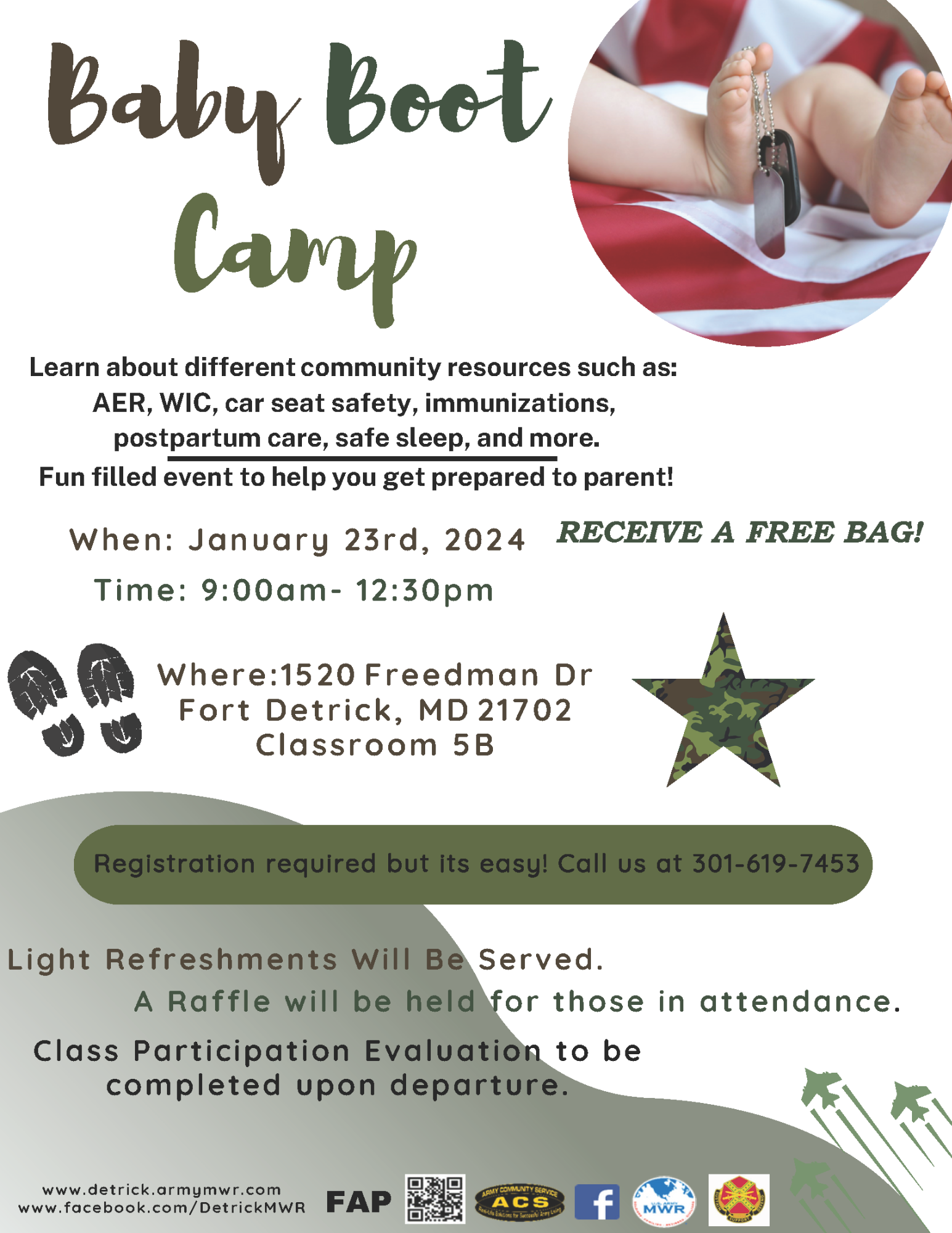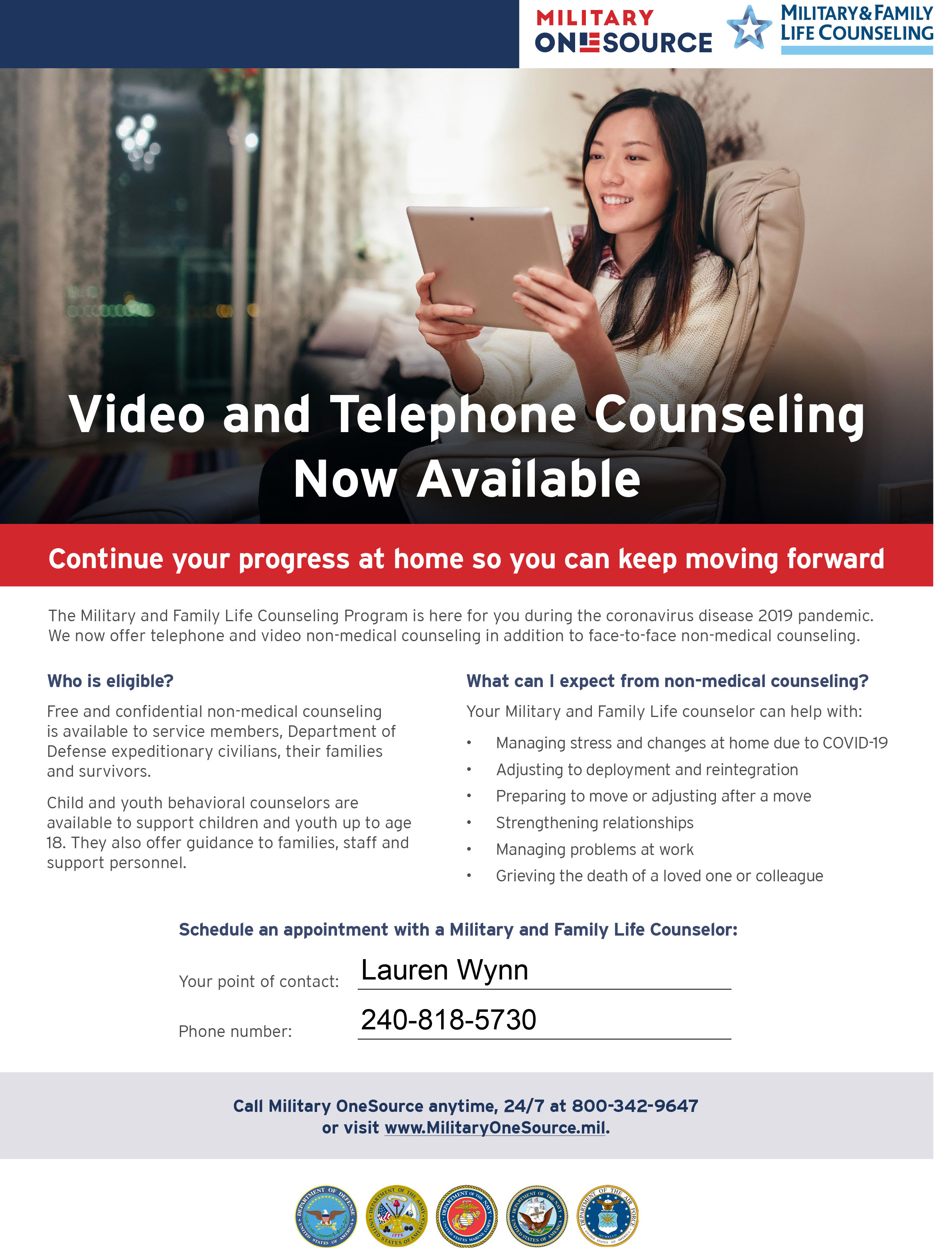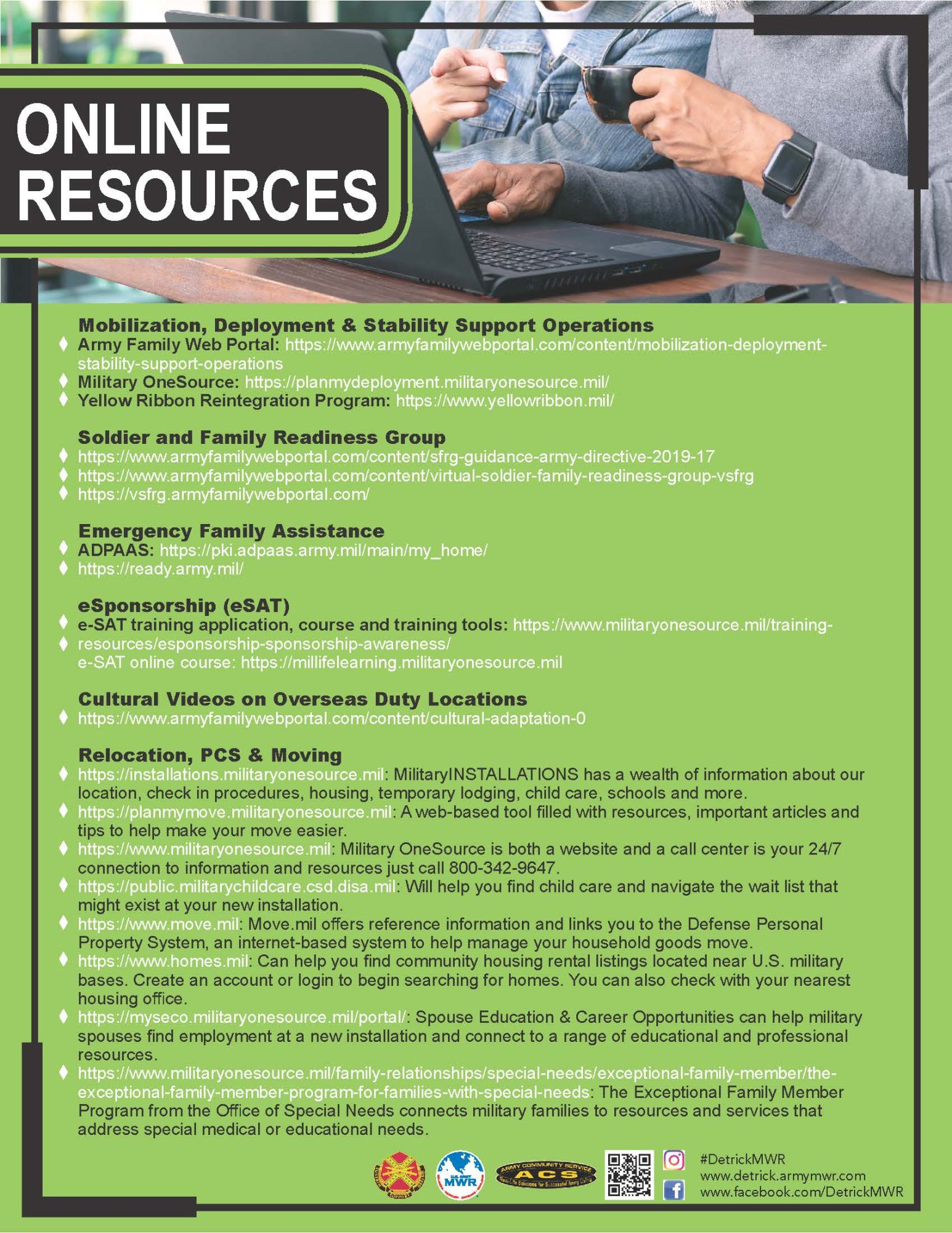- Learn About Army Life
-
Army Family Team Building (AFTB)
Army Family Team Building is a series of training modules taught through your local Army Community Service or Family Programs office that covers topics such as basic information about the Army, personal growth and leadership skills. AFTB improves personal and Family preparedness which enhances overall Army readiness and helps America’s Army adapt to a changing world.
AFTB helps you to cope with and enjoy the military lifestyle. Many of the courses can be applied toward resume and career building, self-development and leadership skills. AFTB provides the knowledge and self-confidence to take responsibility for yourself and your Family. The training is available to Soldiers, Family members of all Soldiers, Department of Defense civilians and volunteers.
My Army OneSource: Army Family Team Building
Contact your AFTB Program Manager more information!
- New to the Community?
-
Information and Referral Program
A comprehensive resource file provides information on both military and civilian agencies to Soldiers, Family members and DA civilians. Trained personnel will assist clients to find the appropriate and available resources.
Where available, this program offers a special Host Nation Services which includes un-certified translations of host nation language correspondence and bills.
For further assistance or help, feel free to contact ACS.
Relocation Readiness Program
Welcome to Relocation Readiness! Moving is a part of life for Soldiers, Government Civilians and their Families. The Army Community Service Relocation Readiness Program provides assistance to the Total Army Family. We are dedicated to ensuring our clients are capable of surviving and thriving through the PCS and ETS processes. We have developed this program to assist you in finding information and resources to make you more resilient and agile as you navigate your next move.
Your first stop once you are notified of a pending PCS or ETS move should be your local ACS (Family Center) where you can meet with a Relocation Readiness Program Manager who will serve as a subject matter expert in assisting you through the process.
Household Goods Lending Closet
When relocating to a new installation, you can borrow basic household good such as:
- Pots and pans
- Dishes
- High chairs and car safety seats
- GPS
- Pre-paid cell phones
- Kitchen appliances
Contact the ACS Relocation Manager for more information.
Adjusting to My New Country*
Host Nation Orientation, where applicable, offers all in-processing personnel and their Families orientation on the local culture, language, transportation and tourism offerings.
Contact your Relocation Program Manager for more information.
*If applicable.
Career Guidance and Employment Opportunities
The Employment Readiness Program (ERP) provides services to military Spouses, active duty Military, active Reserve and National Guard, Wounded Warriors, Retirees, DoD Civilians, and all Family Members. Services include:
- Up-to-date resource information on available local, national and international employment opportunities, job market trends, and education and volunteer resources.
- Classes and seminars on self-assessment and career exploration, resume writing, interviewing techniques, dressing for success, networking, and entrepreneurship.
- Resume critiques
- Career counseling and individual career assessments.
- Job fairs and other hiring events.
- Teen/youth employment Information
- Computers with internet access, resume writing software, and typing tutorials
Contact your Employment Readiness Program Manager for more information.
Financial Readiness Program
The Army is here to help provide you with information on matters dealing with money. From financial calculators to tax preparation, these tools can help you on your way to financial success.
- Volunteer
-
Army Volunteer Corps can link volunteers with local volunteering opportunities.
What can volunteering do for you?
- Gain a sense of satisfaction and achievement by meeting challenges
- Learn about the Army, its sister services, and the community
- Acquire new skills and expand existing ones
- Obtain work experience
- Build new friendships and become a cohesive part of the community
Contact your Volunteer Corps Coordinator for more information.
- Family Members with Special Needs
-
The Exceptional Family Member Program (EFMP) is a mandatory enrollment program that works with other military and civilian agencies to provide comprehensive and coordinated community support, housing, educational, medical, and personnel services to Families with special needs. Soldiers on active duty enroll in the program when they have a Family member with a physical, emotional, developmental, or intellectual disorder requiring specialized services so their needs can be considered in the military personnel assignment process.
Family members must be screened and enrolled, if eligible, when the Soldier is on assignment instructions to an OCONUS area for which command sponsorship/Family member travel is authorized, and the Soldier elects to serve the accompanied tour. This screening consists of medical records review for all Family members, and developmental screening for all children 72 months of age and younger.
Soldiers are responsible for keeping their EFMP enrollment current as exceptional Family member (EFM) conditions change or at least every three years, whichever comes first.
The Exceptional Family Member Program (EFMP) provides an all-inclusive approach for community, educational, medical, housing and personnel services for Families with special needs. An exceptional Family member may be a child or an adult with any physical, emotional, developmental or intellectual disorder that limits the individual's capacity to engage in pursuits with peers or that requires:
- Special treatment
- Therapy
- Education
- Training
Respite Care Information Army One Source: Exceptional Family Member Respite Care Program
Enrollment and Screening Information US Army Medical Department: Exceptional Family Member Program
Contact your ACS EFMP Manager for assistance.
- Violence Prevention and Education
-
The US Army Family Advocacy Program is dedicated to the prevention, education, prompt reporting, investigation, intervention and treatment of spouse and child abuse. The program provides a variety of services to soldiers and families to enhance their relationship skills and improve their quality of life. This mission is accomplished through a variety of groups, seminars, workshops and, counseling and intervention services.
- Emergency Placement Care Program (EPC)
- Victim Advocacy Program (Domestic Violence)
- Sexual Harassment and Assault Response Program (SHARP)
- FAP education and prevention
- New Parent Support Program (NPSP)
- Support groups and enrichment classes
Contact the Family Advocacy Program Manager to begin.
Sexual Harassment Assault Response and Prevention:
SHARP 24-hour Response Hot Line: +1 (877)995-5247
Victim Advocacy ProgramThe Victim Advocacy Services Program provides comprehensive assistance and support to victims of domestic abuse and sexual assault, including crisis intervention, safety planning, and assistance in securing medical treatment for injuries, information on legal rights and proceedings, and referral to military and civilian shelters and other resources available to victims. Victim Advocacy services are available 24 hours a day, 7 days a week to Soldiers and Family members.
New Parent Support Program
The Army’s New Parent Support Program is a key secondary prevention program within the Family Advocacy Program which falls under the umbrella of Army Community Service. Established in 1995, this voluntary participation program helps Soldiers and Family members who are expecting a child, or have a child or children up to 3 years of age, to build strong, healthy military families. Through a variety of supportive services including home visits, support groups and parenting classes, the NPSP helps Soldiers and Families learn to cope with stress, isolation, post-deployment reunions and the everyday demands of parenthood.
- Deployment or Mobilization Assistance
-
Welcome to Mobilization and Deployment! Our mission is to provide training, information and assistance to Soldiers, Civilians and their Families to maintain individual readiness throughout the entire deployment cycle. Deployments can be challenging—a highly emotional and stressful event for Soldiers, Civilians and their Families. Fortunately, Mobilization and Deployment is here to provide guidance, resources and training for all; Soldiers, Civilians and their families; to include parents, Family Readiness Group members and Rear Detachment cadre and ACS/Reserve staff throughout the Army Force Generation (ARFORGEN) cycle. Whether supporting deploying units by providing pre-deployment information and material to Soldiers, Civilians and their Families; to providing reintegration and RESET training as they reconstitute their Family unit, the Mobilization and Deployment Team is here to support you! Our TEAM is always ready to provide quality service for our Soldiers, Civilians and their Families.
"ARMY STRONG, FAMILY STRONG"
- Relocation Readiness
-
Information, Referral and Follow-up (I, R&F) Program
I, R&F supports soldiers, civilians, and their families relocating from installation to installation.
Services include in-processing, out-processing, Permanent Change of Station (PCS), Newcomer's briefings, Sponsorship training, Home buyer, and Re-entry workshops, Welcome packets, worldwide installation information files and Lending Closet are also available.
The Relocation Readiness Program is located at Army Community Service, we provide relocation counseling, guidance and planning services for your next move.
- Family Readiness Group
-
The Family Readiness Group (FRG) is organized to provide mutual support for a unit's family members. FRG forms the third component of the Army's family support system during deployment. It operates during periods of normal operations, as well, in close coordination with the affiliated unit and, if convenient, with ACS or the Reserve Component Family Program Coordinator's Office. The FRG also serves as an important source of inspiration, training, and support to empower Army families to increase and enhance their self-reliance.
Goals of the Family Readiness Group: To provide an opportunity for family members to mutually support each other, prevent isolation, provide information, help involve families in unit activities, and refer families to community resources when needed.
The two distinct levels of effort of Family Readiness Groups:
- Activated function - The effort is concentrated around events such as pre-deployment and mobilization, deployment, and the immediate post-deployment periods. FRGs provide support to family members and soldiers by offering information on unit activities and meetings, and referral assistance about community resources. Activities during this level are geared toward helping family members prepare for imminent separation, cope during the separation, and to bond with other family members in the unit.
- Sustaining function - There is a reduced degree of interaction between FRG volunteers and family members as well as within the FRG organization. This period occurs mainly during non-deployment periods. During this period, FRGs continue to update rosters of family member addresses and telephone numbers, continue regular meetings between FRG representatives and unit leaders, and, through group meetings or telephone contacts, provide welcoming, sponsorship, orientation, and networking support for new family members and families in crisis or transition.
- Soldier and Family Assistance Center (SFAC)
-
Walter Reed National Military Medical Center (WRNMMC)
8901 Wisconsin Avenue, Building 62, 2nd Floor
Bethesda, MD 20889
WRNMMC SFAC is American Disability Act Compliant.Hours: Monday-Friday, 0730-1630
Phone Number: 1+(301)400-0208
The Soldier and Family Assistance Center (SFAC) is co-located with Warrior Transition Unit (WTU) to assist the wounded, ill or injured Soldiers and their Families. The SFAC is a comprehensive, centralized office that provides a variety of services to assist Soldiers and their Families with administrative and personal needs during their Transition process.
Goals:
- Provide assistance to 100% of the Warriors in Transition that are assigned/attached to the WRNMMC WTB and their Family members
- Co-sponsor events in support of the Warriors in Transition
- Establish links with outside organizations to support the Warrior in Transition and their Family members
- In-process 100% of all Warriors in Transition that are assigned or attached to the WTB
- Market the SFAC program to allow the community to fully understand the support that is being provided
- Maintain a data base of quick access programs that can assist with Lodging, Taxi, Rental Vehicles, Flights
- Maintain the Client Tracking System (CTS) to account for the SFAC support provided to the WT/Family members
How does the SFAC provide the administrative services? The SFAC provides services in one of the three methods:
- SFAC service provider is currently located in the SFAC
- SFAC staff calls service provider forward to provide the service in the SFAC at the convenience of the WT/Family member
- SFAC staff schedules priority appointment for the WT/Family member with a service provider at the service providers current location on the installation
What are some of the services provided by the SFAC?
Military Personnel (MILPER) - Assess the projected WT population and determine the optimum method for conducting in/out processing. Provide the Warrior in Transition and Family member with ID card & CAC Card services, Update DEERS, SGLVI, DD93, Military records and other related military documents.
Social Services Assistance (SSA) - Provide substance abuse prevention training, education, crisis intervention, information referral services, intervention and counseling to the Warriors in Transition/Family members. Coordinate and arrange respite care services for families with special needs through ACS, Exceptional Family Member Program (EFMP).
Information and Referral Services (I&R) - Assess the individual and Family needs, provide information and make service referrals within the center and to external agencies. Maintain resource listings on a variety of installation, local, state, and federal agencies which offer support services to WT. Resource listings will include services to special needs' population.
Financial Counseling Services - Counsel & Educate Warriors in Transition/Family members on personal financial self-sufficiency, developing a spend plan, budget planning and development. Provide counseling & debt liquidation services to Soldiers & Family members to prevent the need for administrative and disciplinary actions. Assist Warriors and Family members with personal Financial Readiness (military pay system, entitlements, how to read the LES, checkbook management, financial counseling resources and procedures, financial planning for family separations, short-notice deployments, and PCS-moves.)
Education Counselor - Provide Army Continuing Education Services to the WT Soldiers on a priority basis. Required services include, but are not limited to, testing, information on education services, scholarships, benefits and Education counseling. Ensure all WT are familiar with the "GoArmyEd" portal procedures for applying for Army Tuition Assistance.
Outreach Program Coordinator - Responsible for linking a variety of military and civilian support services with the Soldiers/Family members who have the greatest need of and are least likely to seek out & utilize such services. The outreach concept describes a method of service delivery and an approach to community organization designed to foster self-reliance & a sense of belonging. The composition of a given community and the priority support service needs of the community typically define the character of the outreach. Obtains data by means of personal interviews, questioners, interview with NCOs, garrison and installation commanders, and consultation with service activities, such as medical treatment facilities, housing referral office, youth services, education center, and other ACS.
Social Security Administration VTC - Dedicated Social Security Administration VTC services that allow all Warriors in Transition and the IDES Soldiers to apply for social security, conduct VTC Directly with a Social Security Administration (SSA) representative and ask questions directly to a SSA representative.
Disabled American Veteran (DAV) - The Disabled American Veterans (DAV) Transition Service Program is designed specifically for active duty Soldiers, Sailors, Airmen, and Marines making the all-important transition back to civilian life. The DAV Representative support WT's with pre-discharge transition assistance, DOD Medical Records review and medical debriefing for chronic illness or residuals of injuries caused or aggravated by military service. This service assures benefit access and protects those injuries/illnesses in the future with the documentation for claim submission.
Chaplain - Provided on and off-site through WTB Chaplains, religious Services are available to support WT's and their families. Services include counseling, religious support, pastoral care, rites and sacraments. Supply materials and references that support counseling situation and spiritual needs are available.
SFAC Computer Lab - SFAC Computer Lab/Lounge: Free internet access, Wi-Fi and the SFAC staff on hand to assist the Warriors in Transition and there Family members with accessing links, USAJOBS, working on resumes, education, grants, DA Forms, printing, etc.
- Financial Readiness
-
Financial Readiness
Defense Collaboration Services (DCS):
Who: Financial clients
What: A webinar platform hosted by DISA
When: Date and time are mutually arranged with client and counselor
Where: https://conference.apps.mil/webconf/detrickfrp
How: Same as an in-person session, only facilitated through DCS. Client is requested to complete ACS intake form and send it back via encrypted email along with LES. Depending on the topics to be discussed, client is asked to pull together information ahead of the scheduled appointment.
DCS Training link:
https://www.milsuite.mil/book/docs/DOC-719382
Financial Frontline Website
Who: Soldiers attaining milestone touchpoints
What: Official Army website with milestone touchpoint training
When: Soldiers are contacted when they attain a personal or professional milestone, especially promotion or PCS
Where: https://www.financialfrontline.org/
How: FRP obtains lists from MPD for new arrivals (seen via DCS), promotions, and those schedule for a levy brief. Soldiers to complete and digitally sign checklists and spending plan worksheets. Soldiers are contacted via email to explain the training requirement and given steps to complete the training. Solders return the required documents for review. Upon receipt, review the documents, digitally sign and return to the Soldier for their record, and add to the Soldier’s CTS record. Unit leaders are engaged when Soldiers fail to complete the requirement.
- Army Emergency Relief (AER) Overview
-
Overview
Army Emergency Relief is the U.S. Army's own nonprofit organization dedicated to alleviating financial distress on the force. AER provides grants and zero-interest loans to Active Duty and Retired Soldiers and their Families. Over 4 million Soldiers supported since 1942. AER officers are conveniently located at installations around the world. Visit ArmyEmergencyRelief.org to learn more.
Education Programs
AER’s Education Program is a secondary mission to help Army Families with the costs of education. The three separate scholarship programs are:
Stateside Spouse Education Assistance Program
• Applicant must be the Spouse or widow(er) of an active duty or retired Soldier and reside in the United States.
• Stateside applicants must be full time students.
• First undergraduate degrees only.
• Active duty military personnel are not eligible.Overseas Spouse Education Assistance Program Major General James Ursano Scholarship Fund for Dependent Children.
Overseas Spouse Education Assistance Program
• Applicants must be a Spouse of an active duty Soldier assigned in Europe, Korea, Japan, or Okinawa.
• Applicants must physically reside with the Soldier at the assigned location.
• First undergraduate degrees only.
• Off post students are not eligible.
• Spouses may be part time or full time students.Major General James Ursano Scholarship Fund for Dependant Children
• Dependent children, stepchildren, or legally adopted children of Army Soldiers on active duty, retired or deceased while in active duty or retired status.The children of Grey Area Reservists/National Guard are eligible as well.
Scholarship awards will be awarded up to half the cost of tuition. Scholarship awards are based on financial need, as evidenced by income, assets, Family size, and special circumstances.
Applications and instructions are available for all the scholarships on the AER website at https://www.armyemergencyrelief.org/resources/
- AER Resources and Forms
- Violence Prevention and Education
-
The US Army Family Advocacy Program is dedicated to the prevention, education, prompt reporting, investigation, intervention and treatment of spouse and child abuse. The program provides a variety of services to soldiers and families to enhance their relationship skills and improve their quality of life. This mission is accomplished through a variety of groups, seminars, workshops and counseling and intervention services.
- Victim Advocacy Program (Domestic Violence)
- FAP education and prevention
- New Parent Support Program (NPSP)
- Support groups and enrichment classes
Contact the Family Advocacy Program Manager, +1(301) 619-7171 or +1(301) 619-7453, to begin!
Victim Advocacy Program
The Family Advocacy Program: Victim Advocacy Services Program provides comprehensive assistance and support to victims of domestic abuse and sexual assault, including crisis intervention, safety planning, and assistance in securing medical treatment for injuries, information on legal rights and proceedings, and referral to military and civilian shelters and other resources available to victims. Victim Advocacy services are available 24 hours a day 7 days a week to Soldiers and Family members.
Domestic Violence Victim Advocate 24-hour Hot Line: 301-514-9544
What is Domestic Violence?
Violence is the intentional injury and/or pattern of intentional acts that affect the psychological and physical well being, safety and security of an intimate partner. Domestic abuse essentially involves the misuse of power and exercise of control by one person over another with whom there is or has been an intimate relationship.
Physical Abuse: Occurs when one person uses physical pain or threat of physical force to intimidate another person. Actual physical abuse may involve simple slaps or pushes, or it may involve a full physical beating to include punching, kicking, hair pulling, scratching, spitting on, threatening with a weapon and real physical damage sufficient in some cases which require hospitalization.
Psychological Abuse: Also known as emotional abuse, occurs when one person controls information available to another person so as to manipulate that person’s sense of reality; what is acceptable and what is not acceptable. Psychological abuse often contains strong emotionally manipulative content designed to force the victim to comply with the abuser’s wishes. It may be emotional abuse in this sense when it is designed to cause emotional pain to victims or to “mess with their heads” in attempts to gain compliance and counter any resistance.
Financial Abuse: Can take on many forms, from denying you all access to funds, to making you solely responsible for all finances while handling money irresponsibly him/herself. Money becomes a tool by which the abuser can further control the victim, ensuring financial dependence on the abuser, or shifting the responsibility of keeping a roof over the family’s head onto the victim while simultaneously denying your ability to do so or obstructing you.
Tension Building Phase: Moodiness, sullen, faultfinding and very critical, withdraw affection, isolate partner, belittle partner, make threats
Acute Explosion Phase: Beat partner often severely, rape, attach with weapons, extremely verbally abusive
Honeymoon Phase: Apologizes, cry and beg for forgiveness, promises to get help, to go for counseling, to do “whatever it takes”, send flowers and presents, promise it will never happen again, make up sex
Reporting Options
Restricted:Restricted reporting allows a victim of intimate partner violence the option of reporting an incident of violence to the victim advocate, family advocacy program manager or social work services case manager and receive victim advocacy services and medical care without starting a law enforcement investigation or having command involvement. It is intended to give victims the care and support they need and the extra time to make more informed decision regarding reporting to command or law enforcement. A victim has the right to change a restricted report to unrestricted at any time within one year from the initial restricted report.
Unrestricted: Unrestricted reporting involves a victim making a report to the service members command, Family Advocacy program or Law enforcement. The incident will be fully investigated and the victim will have access to victim advocacy services and FAP clinical services.
What can you do to ensure safety?
- If the situation is lethal and you can leave safely, do so
- Contact a victim advocate or local shelter for safety planning and resources
- Seek a civilian or military protective order
- Change locks, add lighting and a possible alarm system or door/window sensors
- Inform family, friends and neighbors of your situation so that they may also keep a look out
- Tell your supervisor and/or school/daycare about your situation so that they may assist
- Always let someone know your whereabouts, be aware of your surroundings
Who do I call for help?
- Fort Detrick Family Advocacy: +1(301) 619-7171 or +1(301) 619-7453
- Heartly House 24-Hour Hotline: +1(301) 662-8800
- Fort Detrick Domestic Violence Victim Advocate 24-hour Hot Line: +1(301) 514-9544
- National Domestic Violence Hotline: +1(800) 799-7233 or www.ndvh.org
- First Call for Help to Maryland Programs & Services Aid: 2-1-1
- Directorate of Emergency Services (DES): +1(301) 619-7114
- Military One Source: +1(800) 342-9647
- Maryland Network Against Domestic Violence (MNADV) http://mnadv.org
- The Women’s Law Center of Maryland: +1(410) 321-8761 or http://www.wlcmd.org
- New Parent Support Program (NPSP)
-

New Parent Support Program
The Army’s New Parent Support Program is a key secondary prevention program within the Family Advocacy Program which falls under the umbrella of Army Community Service. Established in 1995, this voluntary participation program helps Soldiers and Family members who are expecting a child, or have a child or children up to 3 years of age, to build strong, healthy military families. Through a variety of supportive services including home visits, support groups and parenting classes, the NPSP helps Soldiers and Families learn to cope with stress, isolation, post-deployment reunions and the everyday demands of parenthood.
For more information, call 301-619-0323
- Military & Family Life Counseling Program (MFLC)
-
For more information or to speak to the Military & Family Life Consultant, call 240-818-5708 (Adult MFLC), 240-818-5730 (Child MFLC).

The Military & Family Life Counseling (MFLC) Program at a glance:
- Provides non-medical short-term, situational problem-solving counseling to Service Members and their Families
- Provides psycho-education to help Service Members and their Families understand the impact of stress, deployments, family reunions following deployments and the stresses of military life
- MFLC services augment existing military support services
- Flexible service delivery (outreach/rotational and on-demand)
- Services can be provided on or off military installations
- Services provided to individuals, couples, families and groups
- Children's Support Program addresses impact of military life on children
- Mandated reporters of child abuse, domestic abuse and other duty-to-warn situations
- Services are otherwise confidential and private, except for duty-to-warn situations
Non-Medical Counseling Services
Life Skills
- Anger management
- Communication
- Relationship issues
- Productivity at work
- Conflict resolution
- Parenting
- Decision-making skills
Military Lifestyle
- Deployment stress
- Coping skills
- Relocation adjustment
- Sadness, grief and loss
- Homesickness
- Separation
- Building resiliency
- Reintegration warrior to citizen
About Military & Family Life Counselors
- Masters or Ph.D. level licensed clinical counselors
- Work with Families, individuals, couples and children to provide non-medical problem identification and counseling services
- Address relationships, stress management, grief after loss, occupational and other individual and family issues, providing crisis intervention when needed
- Work with existing Military Family Support programs to complement services provided
MFLC is intended to serve all Services and Guard/Reserve components.
Guard/Reserve Component Services
To maximize the support available to Guard and Reserve Service Members while preparing for the issues surrounding pre-deployment, mobilization and post-deployment, the MFLC Program:
- Provides psycho-educational presentations, briefings and counseling support for drill weekends and Family events on a variety of topics, including deployment, mobilization, reunion and reintegration, communication and sadness, grief and loss
- Provides services including educational and counseling services for Families, pre-deployment events for Service Members, deployment presentations for younger audiences, marriage enrichment and stress reactions and coping mechanisms
- ACS Program Contact Info
-
Contact information for all ACS programs:
ACS Outreach Program
DSN
Civilian
ACS Outreach Program Manager
Army Volunteer Corps
DSN
Civilian
Army Volunteer Corps Manager
Employment Readiness Program (ERP) DSN
Civilian
ERP Manager
Exceptional Family Member Program (EFMP)
DSN
Civilian
Fort Detrick EFMP Manager
usarmy.detrick.usag.mbx.acs-efmp@army.mil Family Advocacy Program (FAP)
DSN
Civilian
FAP Manager
Victim Advocacy Program
DSN
Civilian
Victim Advocacy Program Manager
Domestic Violence Victim Advocate 24-hour Hot Line:
Financial Readiness Program (FRP)
DSN
Civilian
FRP Manager
Army Emergency Relief (AER)
DSN
Civilian
AER Manager
N/A
Relocation Readiness
Information, Referral & Follow-up ProgramDSN
Civilian
Relocation Readiness Program Manager
Soldier and Family Assistance Center (SFAC)
DSN
Civilian
Soldier and Family Assistance Center Manager
Temporarily Closed Due to Covid-19
N/A
Military & Family Life Consultant (MFLC)
DSN
Civilian
Military & Family Life Consultant
N/A
Sexual Harassment/Assault Response and Prevention (SHARP)
DSN
Civilian
Fort Detrick, Safe Helpline
Sexual Assault Response Coordinator (SARC)
Click here for Sexual Assault/Harassment Hotline
Fort Detrick SHARP Office is located at 243 Porter Street, Fort Detrick, MD 21702
You can also contact the below assistance telephone numbers:
Child and Intimate Partner Abuse
Restricted Report Unrestricted Report
Report Child Abuse to your local Police & Child Protective Services
Intimate Partner Abuse
301-514-9544
Fort Detrick
301) 619-7114
Forest Glen
(301) 319-5501
- Sponsorship Training
-
Sponsorship training is available upon request in either a group setting, one on one, or online. Please call 301-619-6364 to schedule in person training. Online e- sponsorship training can be accessed through Army OneSource at: https://myhub.militaryonesource.mil/MOS/f?p=SIS:2:0
Sponsorship awareness information for Families is online and designed for family members to learn more about the sponsorship process at: https://myhub.militaryonesource.mil/MOS/f?p=332:9:202241225107034::NO:::&success_msg=You%20are%20now%20enrolled%20in%20Sponsorship%20Awareness%20for%20Families.%2Fvz4EJKAKKWeCt47cn8Aer2SnFFw%2
Army Community Service (ACS) offers many programs and services that are designed to equip Service Members, DoD Civilians and Families with the skills, knowledge and support they need to face the challenges of military life. Whether you change duty stations, deploy, manage the Family during deployment or adapt to new situations, ACS has a program to help you and your Family adjust.
Army Family Action Plan
Army Family Team Building


